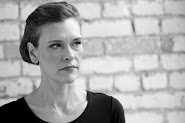Polemics (def.)
In my reading this week I'm asking (with feminist poetics in mind) what a vision for fourth-wave feminism might be. If previous waves achieved suffrage, abortion, property rights, affirmative action, and post-traumatic stress re-feminination, what would a fourth wave achieve? I have yet to see in my readings a vision for fourth-wave feminist poetics. Or for feminism itself besides its mythic subsumation in humanism as the monster in Loch Ness.
Economic problems remain.
Second wave to me means post-suffrage. If second-wave feminism was indeed a universal abortion-rights movement, could average secular health care consumers have achieved it without feminism? Second-wave feminism is like an oboist told to hide in the closet or leave by fire escape when guests arrive. To be a woman in hiding (if she were embodied), a woman such as Andrea Dworkin. Why do so few acknowledge pride in having seen her?
Few words in English begin in "dw": dwarf, dwell, dwindle.
I learned needle arts as a child: embroidery, sewing, hand sewing, knitting, crocheting, needlepoint, macrame. In my family it was a girl's rite. My brother smoked pot in his orange room with a blue earth painted on it. German women I knew knitted while studying for das Abitur and at abortion rallies. My former boyfriend who had spent four years in federal prison before I met him needlepointed there but not later. While these are soothing pastimes (unlike the pastime diatribe), they do not suggest sky's-the-limit possibility the way "symphony" or Nobel do.
I attended public ivies. "Do you know anyone in dictionaries?" I asked cronies who called. During a hiring eclipse of the 90s, I became back listed in the gift economy, and wanted after exhausting myself in hunting out composition jobs to work "in dictionaries." I wanted, in particular, to work on the Dictionary of American Regional English. If an objective researcher were to follow every tick, every movement of my long reservation, s/he would see somebody who had tried.
As the outlying crony of certain crazed writer men, I hear wild stories from the bureaucracies. Tenured English professors not proficient in English? "Yekes" a pejorative term for German Jews in Israel? A few poems equal in points to a novel for tenure? It generally seems true that what these ambitious men still want or need is more: more money, prestige, fame, opportunity. What women I know want is that (more) at a different level, some or a little more. A woman's most valuable asset is her beauty. Beauty has been re-adjudicated along ethnic lines. Age irks a woman to extend her beauty competitively over time.
I shan't be interested in a fourth-wave feminism that commoditizes physical beauty and discredits experience by a number.
"Man's gotta eat" is still the best reason to hire him to do something. Whether women able to eat do eat becomes a question -- along with a whole bin of questions -- relegated to psychiatry.
A lesbian-centric movement such as late second-wave feminism -- though it produced texts on madness -- did not protect women as a group from diagnosis, divorce, trial abortion, single motherhood, and ostracism. Therapy separated us. In therapy we portrayed, betrayed, and paid for love in sessions that diverted us from lifelong friendships, mentorships, and associations from which organic intellectual works might spring. "Average" women to the movement were women who had not achieved conscious liberty: wives whose idea of orgasm was phallogocentric were seen as less brilliant, conscious, and aware unless they traded caste.
If second-wave feminism furthered gay rights as we know it -- including the right to marry and have children -- what would fourth-wave gay feminism produce? What do people need?
Noted: essentialism is a bugaboo in poetics dialogue among women in their 30s; voice may be another, yet I see voice as a second-wave commitment.
Subscribe to:
Post Comments (Atom)













No comments:
Post a Comment